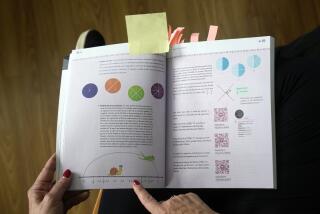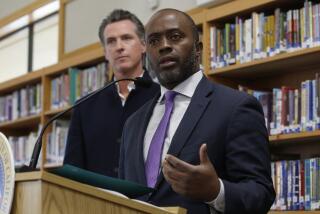Islamic Council Seeks to Broaden Textbooks’ Scope
- Share via
FOUNTAIN VALLEY — The Council on Islamic Education has for the first time invited scholars from other backgrounds to join them in a national conference designed to change the way textbooks describe their cultures.
The Fountain Valley-based council is hosting a two-day conference in Orange this weekend with educators, scholars and publishers to discuss how textbooks can more accurately reflect cultures around the world.
Since its founding six years ago, the council has worked to show educators and textbook publishers that Muslims and their beliefs have sometimes been portrayed incorrectly in American classrooms, and it has succeeded--with previous book conferences and by lobbying in Sacramento--in getting some textbooks changed.
This year, for the first time, the council is broadening the scope of its textbook conference to include African Americans, Asian Americans, Latin Americans and Native Americans who hope to accomplish the same thing.
“Why textbooks? The average person’s knowledge of world history stops after they graduate from high school,” said Shabbir Mansuri, the council’s founder and director. “If that is the case, then we are raising a generation of people who don’t know much about the world.”
The conference will address the shortcomings of world history textbooks, specifically the lack of accurate information about non-Western cultures and the way world history is taught from a purely Western perspective.
Mansuri, a Muslim born in India, founded the nonprofit organization six years ago after his daughter showed him a passage from her social studies textbook. The textbook stated that Bedouins prayed by slapping their cheeks and rubbing their faces in the sand. His daughter thought it was a funny description of Muslim prayer. Mansuri was not pleased.
And so began his quest for textbook reform. The council has since published textbook reviews and serves as a Muslim information resource by putting educators in touch with Muslim scholars.
After three such conferences, Mansuri says publishing companies have made content changes.
“There is a trend toward a more inclusive approach,” he said. Publishers “are sincere; they want to know more about it.”
*
Though the conference is hosted by an Islamic organization, the forum will include organizations representing views from all ethnic groups.
“They have dealt in the problem of teaching world history in the schools, not just teaching Islam,” said Ross Dunn, history professor at San Diego State University who will be attending the conference.
Heidi Roupp, one of the conference’s participants, has been a teacher for 35 years and says that a good textbook is more important than ever.
“People shouldn’t be surprised to find out that there’s a difference between Japanese and Koreans, or [incorrectly] treat Africa as a country rather than as a continent,” Roupp said. “I want students to have an accurate view of the world.”
Mansuri acknowledges that the move to include more non-Western cultures in textbooks has come under criticism. The conference directly addresses the issue in a session that explores striking the balance between Western and global perspectives.
No matter what will be discussed, the forums are designed to be nonconfrontational, Mansuri said.
“There are no answers. We want to initiate the process,” Mansuri said. “It’s not about one group versus another. What we are trying to say is, ‘Let’s sit down together and make this a trend toward inclusion.’ ”
The conference will be Saturday and Sunday at the Doubletree Hotel in Orange.
More to Read
Sign up for Essential California
The most important California stories and recommendations in your inbox every morning.
You may occasionally receive promotional content from the Los Angeles Times.










